September 30 marks one year since we sailed away from Belfast, finally starting our Residential Cruising journey that we set into motion in May of 2023.
The year we’ve had sailing around the world with the Odyssey is highlighted by the locals we’ve met in ports, and interacted with. For me, that’s what travel is all about — interacting with people.
Living on the Odyssey isn’t a vacation for me, it’s my home. I’m having a wonderful time as we sail the world. I don’t have to cook, clean, do laundry, or even plan the journey! I choose every day what I’m going to do be it work, chill, explore the new port, or go on an excursion. My days have become a lovely flow of doing what I want at a leisurely pace. I’m grateful to not be pressured into dashing about helter-skelter.
Moving onto the Odyssey was a good idea. Randy’s allergies were the impetus for the move, and we both have benefitted in unexpected ways. What started as a health necessity became a lifestyle revelation.
Friends Who Live In Far Away Places
Our friend who lives in Portugal, and in Italy, treated us to a marvelous day when we visited Lisbon. She hired her favorite tour guide to drive us in a tuk tuk to her favorite places. We saw magnificent views from the tops of the hills and ate natas (the Irish term, or Pastel de Nata — the wonderful Portuguese custard tarts I discovered when I walked the Camino Portuguese) in the bakery that originated them.
I saw reminders of the Camino from shells and arrows to plaques. There were wonderful tiled murals on walls, reminding me of Porto and my Portuguese Camino start. The old and the new blend together beautifully, especially when shared through the eyes of a friend.
On the Isle of St Kitts we connected with one of Randy’s readers, who directed us to a fabulous dentist who fixed Randy’s teeth (a couple broke just before we left Belfast), and then the friend took us to his place for conversation and views from his eagle-perch home. We were treated to a tour of his favorite haunts on the island and then taken to his favorite dining spot. We returned the next day and took him to dinner at another of his favorite places in gratitude for all of his hospitality.
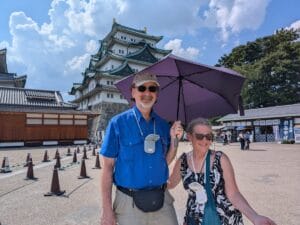
Nagoya, Japan, provided more treats. We were guests of a long-time friend and associate, and his wife. We experienced the town differently than if we’d just spent part of a day on our own. For example, he helped us navigate the metro system, which was a maze of options, like many of the Japanese cities’ systems.
When we visited Nagoya Castle we learned it was still closed for renovations so, after walking around the grounds, we sat in the shade of a pergola-like structure. There an old man stopped to chat and share his years of experience. He explained that he walked there every day to find new people to talk to. I guess that was how that senior kept his brain active. Something for me to use as I get older.
Surprise Encounters
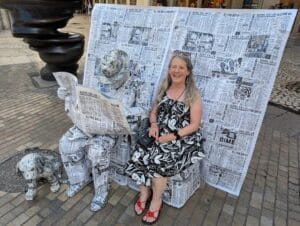
We have seen so many wonderful sights and sites. Hiking The Rock of Gibraltar was amazing! Wow, was I out of shape! I had no idea that it was home to caves and old army installations. And meeting a man who carves replica rifles for display in a diorama of one of the caves that used to house and hide the military was fascinating. Meeting him was the beginning of the thread of experiences I appreciate in my travels.
The very next day, Randy and I wandered around the streets of Málaga, Spain. We enjoyed the narrow streets, fortress, and rich culture. Yet, with all of that going for it, what stands out to me the most is the Newspaper Man, a street artist. He was dressed in a dapper suit with bowler hat of newspaper sitting in a chair wrapped in newspaper, with a dog of newspaper sitting at his feet.
We enjoyed the mime’s costume and sticking to his role. Then he moved by putting the paper down and silently greeting us. I burst out laughing and we started talking. It was a lovely exchange, one that puts a smile on my face still.
Ship People
Not all of the surprise encounters are ashore, either. I love flash mobs, and was thrilled to be part of one for the onboard wedding. Being part of it was fun because it was a dream come true, and I got to know some of my neighbors in ways I hadn’t gotten to know them before. Dance and music bring people together in delightful ways. So much so that after the conga line we jumped into the pool. Even the Captain jumped in with us. All of us were still dressed in that day’s clothes (the Captain, his uniform!)
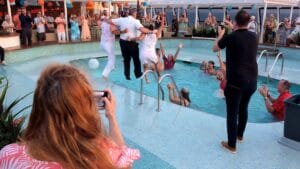
This experience reminds me that the best parts of travel often come from the unexpected. I’ve learned not every scheduled port works out — life happens. Staying open to possibilities means I’ll have different marvelous experiences instead. We are learning that flexibility. Our week in the Chilean fjords is a prime example of that awareness. Originally we were disappointed to not visit some of the scheduled ports, but that gave us more time to ford the fjords. The magnificent beauty made us grateful to see the multitudes of waterfalls on many hill faces, the calving ice flows, the icebergs, and whales.
In Asia, playing keep-away from typhoons brings an interesting energy to the ship, a bit of anxiety and thrill; will everyone get back on board before we have to sail away? Will the new staff be trained enough to handle a ship full of diners? And will the residents have ready access to their sea sickness medicines and tricks?
The connections we make with each other, and the staff and crew, is heart warming to see. Reconnecting with neighbors who had taken time off to explore a country not touched by the sea or who were taking care of medical appointments, brings joy — at least based on the huge smiles and hugs I saw and gave. Loved crew returning from their breaks were given the same huge hugs and smiles as our neighbors. We are a close community.
Service People
Skagway, Alaska, was a treat and surprise. We’d visited there on our Inside Passage cruise ten years before. The changes were a bit disorienting. We roamed the town, poking our heads into alleys and parks. To our delight we came across a park ranger who was stationed outside a house which seemed as much living museum as anything.
She was showing people what games during the gold rush days were like as she attracted people into the yard. We had fun watching her play the games and trying our hands at them. And it was a quiet enough day that we had the chance to enjoy lots of varied conversation before she became inundated with kids and their parents wanting to play the games. We felt as if we had struck gold.
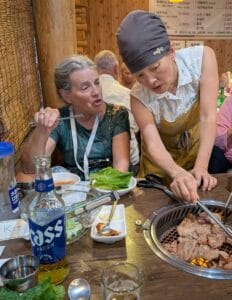
Then there was the head waitress (owner?) at the Korean BBQ we went to on Jeju Island, South Korea. She was incredibly attentive to my table. While she cooked and cut up our pork strips on the grill, she talked with me. We bonded and enjoyed our exchanges. Oh, and the food was good too. 😉
It’s interesting to see how the pop-up shops appear at the ports where we dock. Amami, Japan, was one of the prettiest port we’d stayed at, with its green hills coming right down to the sea. Many of the Japanese islands had ports like that, though there was something about Amami that really grabbed me. We browsed stalls that had kimonos, sake, magnets, and T-shirts. The last one illustrated endangered animals and the importance of the environment. The artwork was on the coffee pour-over package and T-shirts.
The father was the artist, who created patterns to highlight the environmental challenges they have on Amami. He brought his older son forward to talk to us. His English was so good that we discussed the art, the business name, the endangered animals, and even his plans after university. It was a magical time for me.
I was reminded this morning that I cherish the performances by locals that we are treated to upon arrival and/or departure. Local dances are so informative about a people and their culture. The music conveys the hearts of the people. The bright colors, feathers, footwork, and hand gestures bring so much to the dances. What a way to be welcomed or bid adieu.
Starting Year Two
We have visited 45 countries and hundreds of different towns and cities. We’ve crossed the equator in both directions, changed time zones both adding and subtracting hours from our clocks, and crossed the international dateline — going to bed Tuesday night and waking up Thursday morning is a non-event…unless you are conducting life off the ship, and then it’s a brain twister to figure out what time the meeting is.
If the first year of sailing has given me these experiences, I’m looking forward with great anticipation for the second year. I’m quite happy staying on “for life,” at least as far as I feel about it at this point. I do consider whether some locations would work for a land home, should I ever need to not be at sea. So far nothing has hit the spot, though Japan comes close. Who will I meet? What conversations will connect us? And how will the clock and calendar flip around in my life?
Stick around and find out.
One Year In: Randy’s Take

We left Belfast, N. Ireland, late on Monday, September 30, 2024. It was much easier for the company (and its bookkeepers) to call October 1 “Day 1”, so there’s a tiny bit of dispute as to when our anniversary really is, but that’s OK: the two important things are, 1) we sailed, and 2) we’re still sailing.
There are so many highlights that just compiling a list would be exhausting. Though there are two common questions: What’s the best part? And, Is it what you expected?
The best part is exactly what I expected it to be: the people. Otherwise known as…
Community
Obviously it’s more complex than that, but if the people sucked, then living here would suck. Yet the bottom line is, in general there’s a certain sort that is attracted to this lifestyle — some common characteristics. They include a thirst for adventure, a certain measure of open-mindedness, the ability to get along with most of the people they meet, and a desire to see the world.
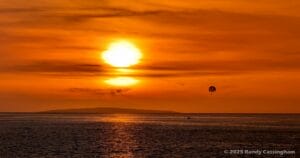
Getting along with “most of the people they meet” is broader than you might think at first glance, as I don’t just mean other Residents. There’s also the crew, who are definitely part of the overall Community, and there are the folks on shore in the places we visit. We have to interact with others constantly, which occasionally overwhelms my introversion. I don’t go ashore as much as Kit does.
“Aren’t there jerks?” some might ask. In my experience, there have been very few — and they either decide this isn’t the life for them and they leave, or they are asked to leave, where “asked to” can be interpreted to mean “told to.”
I’ll be explicit about that: there has been more than one case of Residents — and crew — who have been directed to leave at the next port, never to return. One way or another, “jerks” generally don’t last long, but I don’t dwell on that since it’s a tiny minority of the experience here.
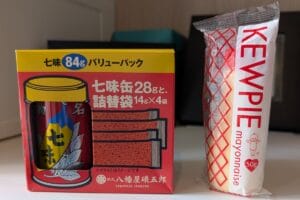
So let’s concentrate on the joys, which are numerous: we’ve had our First (and Second!) Wedding.
Kit and I sometimes choose to sit at a table for two for meals so we can talk. Most of the time, though, we prefer to sit at a larger table so we can dine with other Residents. Sometimes that’s planned, but usually it’s spontaneous, either inviting someone to join us, or accepting someone else’s invitation.
Any Negatives?
Well, sure.
No ongoing experience is perfect, especially when the company is a pioneering startup. Certainly there are glitches, most often beyond the company’s control, such as our recent need to leave Taiwan hours early to get past the season’s first “Super Typhoon” and get to a literal safe harbor in the Philippines …and then we had to leave early again because a second typhoon was coming straight at us in the Philippines!
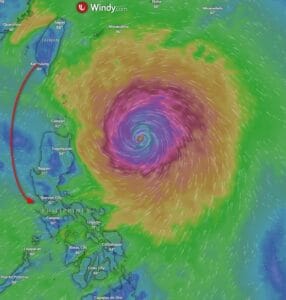
That truly didn’t cause me concern: we could move out of the way; the Philippines couldn’t, so our concern was for the people who had to go through the storms. All in all, I’m grateful that this company exists so I can experience this lifestyle. Anyone who can live here should feel that gratitude pretty much every day.
If there’s anything to fault the company for, it would be this, and it’s right back to my main theme: Community. There are so many talented people living here, and as a startup the company has a number of issues to solve. Whatever their problem, we probably have someone here who could easily help them.
Example: the dining rooms see big surges of people which overwhelm the waiters, and sometimes even the kitchen, and things get slow. Two different food service professionals that I know of have offered to help train the staff in how to handle surges more efficiently. One in particular has opened more than one successful restaurant and knows exactly what the issues are. Yet the company has refused his help. The reason I heard was they don’t want to “blur the line” between Residents and employees.
I get that: it could easily get out of hand. But they need to trust onboard managers to give it a try to see what they can learn from that volunteer. Just give the permission to spend a couple of days with him, and then evaluate, adjust, or say “thanks anyway.”
Why is this a “Community” issue? Because in a true community (especially a small one!), volunteers matter. For instance, I could help train the crew in how to safely move someone who is injured. I know that I wouldn’t be called to assist in a medical emergency for all sorts of liability reasons, but I have decades of experience in patient assessment and transporting injured people. There’s an art and science to it to both reduce creating more injury, and avoid inducing pain.
They even have my favorite piece of equipment to help pick up and move patients — a scoop stretcher — but I would be surprised if their response teams really knew how to use it. (Not saying they don’t, just that I don’t know that they’ve had such training and, more importantly, practice in using it on real people.)
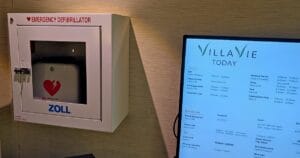
Happily, they do have several AEDs placed around the ship, which they didn’t get until we suggested them. Kit and I have both proctored students in testing CPR skills, including AED usage, and we’d be happy to do that here, too.
Communities are strengthened by volunteers, and pretty much the only place we’ve been allowed to volunteer is for entertainment-related things. Not just Speakers Corner, but there’s a choir, and even some community theater. We could do much more.
On regular cruise ships, the only Community is among the crew, and they’re itinerant — segments come and go on a regular basis, even the captains. Here, the primary community is unheard of in the cruise business: Residents, and we welcome the crew as part of our Community. (It’s important enough that I capitalize that use!) But it’s incomplete when we’re actively prohibited from participating in many aspects of improving it.
All in all, though, that’s hardly a show-stopper, but it is a frustration, and I think it’s slowly improving.
Communications
The other weak aspect is, in general, communications.
First, as far as I’m aware, the company has no one who is trained in, for instance, editing, and messages are often so unclear as to cause confusion and complaints, which are then cleared up with a second message. A simple edit pass by a professional could avoid lots of gnashing of teeth. I have offered to edit such messages, such as to communicate a policy change, and only once did one of the staff ask me to edit a message for them. I did find a couple of clarity issues and fed that back and was thanked very kindly …but that was in June and have never received such a request again.
It’s a frustration, and the cause for a lot of misunderstanding and, I believe, “bad press” online, which amplifies tiny negatives while ignoring the many, and much larger, positives.
The second aspect of communications is something I raised in my other blog about the August tsunami. An NCL ship docked in Hawaii knew they had to head to deep water to be safe, but didn’t recall passengers who were ashore before they left, even though the ship had hours of warning.
To copy over what I said in that post about the failures of NCL, which our company should learn from:
Addendum: the Real Issue is Communications
Every time — every single time! — I’ve been involved in a big emergency incident, the After Action analysis points to failures in communications as a contributing factor to the chaos.
And I’ve seen it time and time again in big incidents I’ve read about, such as the Columbine School Shooting. Whether it’s the radio system being overloaded, different responders from different agencies not having common communications systems to be able to talk with each other, or simply having someone (or in truly large incidents, several someones) assigned the responsibility to communicate what’s going on to the first responders involved, and/or the public at large.
The Tsunami Warning System is very well set up: it did its job of communicating what was going on, what was at stake, when it was going to happen, and delivering that message to those who needed to hear it, such as Emergency Managers in every coastal area at risk.
That’s fairly easy; the feds just say “Here’s how we will tell you” and it’s up to local officials to monitor that channel.
The hard part is, “then what?”
We definitely need a communications channel where the ship can contact us in an emergency. Yep, it depends on us having either cell service when ashore, or a WiFi connection (e.g., in a restaurant, an excursion bus, or shopping area, which connections are typically available).
Yet currently, the best we have is someone aboard ship sending a message to individual people to give them a heads up that, say, we need to leave early because of a typhoon. That is a poor substitute for setting up a robust system and then telling us, “Here’s how we will tell you.”
A reader on that blog post commented that “You can have an emergency WhatsApp group set up with everyone who wishes to participate and have alerts from it always set to on and the loudest. Then it is only used for extreme emergencies. Just a suggestion.”
My response:
The problem: MANY refuse to have Meta products installed on their phones due to the incessant tracking. My suggestion to the company, in order of preference: their own app with communication ability, a lightweight app from a service designed for this specific sort of notification, a Telegram group, a Signal group. Apps take awhile [to create], but a Telegram group can be implemented within the day; getting Residents to add the app (if they don’t already have it) and communicating the purpose will take longer. I put Telegram above Signal since it’s used by more people, and is particularly friendly to groups.
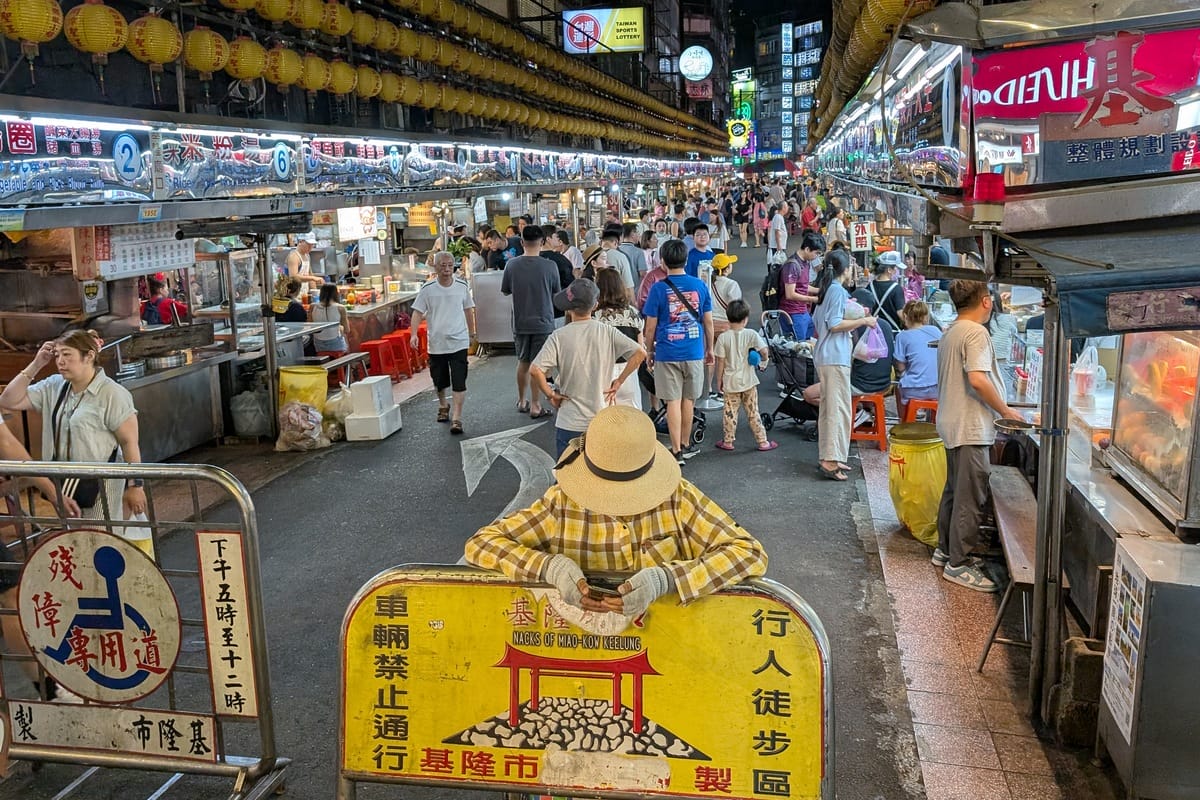
The Bottom Line
The negatives are about fine-tuning. The positives are more numerous, and fantastic.
One Year In: Life On The Odyssey is …pretty darned great. It’s definitely what we expected, we’re definitely happy here, and we are for sure staying for years.
Originally Published September 30, 2025 — Last Updated October 5, 2025


Happy travel anniversary to you both. So glad you’re enjoying your new home, and thank you for sharing your stories with us.
So glad you two are enjoying life and experiencing it to the fullest! I love following your journey and imagining your joy. You are missed here but sounds like you’ve found a great community and home, basically Nothing is more important.
—
We miss all of our Colorado EMS buddies, but we were ready for new adventures. We sure found them! And even had a first responder event on board. I think I freaked the doctor out when I gave him my succinct handover report. 😎 -rc
We have found a community to be part of — an active part. We miss Colorado — Ouray County in particular; the people, the views, and the weather. Life is good, and I’m happy you are a part of what makes up my life.
Yes, it is pretty darn great.
Thanks to both of you for your enlightening stories; I thoroughly enjoyed reading both of them. I hope to join you on the Odyssey at some point in the future and this type of information is just what I need. I would be packing now, but my wonderful and loving senior (15 year old) fur baby prevents me from doing so. I fully understand why dogs can’t be aboard, but I so wish they could. 😊 Enjoy Year 2, and I hope I will be able to meet you both in the near future!
—
Sounds good! When you sign up, please mention us as your reference when you call. -rc
Thanks for sharing this recap. We still enjoy, perhaps even vicariously, following your new lifestyle and adventures.
I’m glad you are tracking us. It’s a lifestyle that’s in process of being woven together daily. And adventure it is, also daily. 🙂
Your first year sounds fabulous! I look forward to more updates.
Communication seems to be the primary sticking point in *every* organization and most relationships. So that isn’t surprising. The reluctance to take advantage of the wealth of knowledge and experience aboard is surprising. And short sighted.
But I’m happy for you that the adventure is going well overall. It’s been fun riding along!
Communication is a challenge in the best of times when all parties want to communicate clearly. It’s working its way out one bump at a time. 🙂
That handover report should have triggered management to realize what a gold mine they have living aboard. Reading about how the company seems to eschew the idea of welcoming help from your many resident experts was certainly frustrating for me and all I was doing was reading about it!
—
Management doesn’t know about the incident (or at least any details). Nor should they. Only the doctor really heard it, he was clearly appreciative, and the rest is patient-confidential. -rc
As seasoned cruisers for over forty years, my wife and I have had several occurrences of instances when passengers with specific expertise and/or training could augment staff and crew on a ship. Occasionally, this happens when an “instant emergency” occurs — think Heimlich maneuver, CPR, etc.…until professional staff can arrive and take over.
In the cases you described (the dining scenario and the review/editing of a notice to passengers) I believe that you encountered the fact that we live in a litigious world and most organizations and companies have policies about using “voluntary” assistance — especially on the spur of the moment. I do not disagree about the communications issue, having been in public service myself for many years; however, somehow it all works out.
Keep up the blogging (and This is True) and keep enjoying all the things that most people never get to do or see.
—
Spur-of-the-moment, when no medical teams are present, is when it’s appropriate to jump in. That’s what we did, and then handed the patient over when the team arrived (quite quickly). I would not hesitate to jump in and Heimlich someone if the need arose. -rc
You reminded me of a choking incident where the staff didn’t respond in a timely manner. Fortunately, an astute resident saw the distress and took prompt action. Staff got a refresher on their training. Heimlick saved the day!
Time flies! It’s already one year?! Love both of your reflections: Kit is on the romantic side, you are on the business side! Happy anniversary!
What a wonderful reflection of our life on the Odyssey over the last year. You each offer a distinct and different perspective to create a complete portrait of the journey. Lynn and I look forward to spending the next 3 or 5 or 10 or 14 years sharing this adventure with you both.
—
Deal! -rc
Glad to have you both along for the ride and adventures.
Fantastic. And I agree. I feel most every day there is at least one surprise for me. And yes, also Communication is key for so many reasons.
Congratulations on a (mostly?) great first year onboard. May you have many more!
—
Mostly great indeed. -rc
Happy cruising anniversary to you both!
I really enjoyed reading both of your recap stories and look forward to reading about your ongoing adventures.
Thanks for sharing with us!
“after the conga line we jumped into the pool”
Was a shipboard tradition thus born?
—
Nah! We don’t tend to get into ruts. -rc
Happy New Lifestyle Anniversary! Glad to hear you both are loving it. You earned it!
I can understand the hesitation from management on accepting certain types of help from the residents. After all, you are their customers and they may have concerns about the external perception of the residents helping them figure out their operational challenges.
—
“Certain types” certainly. Yet refusing other “certain types” of expertise can be seen as stubborn and foolish. -rc
Thank you for this. I’d like to do the same. In my next life, I’ll make certain.
In this life, my husband and I spent years enjoying life with our only home being on wheels. Floating seems so good. All the advances in communications is nice now.
—
Yes, the tech makes it a LOT easier. We considered RV life, but we wanted to see “the world”, and I didn’t want to drive. -rc
I love the logistics content as always. I read a great deal of articles about cruising as my algorithm sees my interest so I was fascinated by news of people being left at port.
It’s your home but it’s also got a Disneyland undercurrent that’s hard to cut through as community runs opposite to that “be our guest” hospitality is king attitude.
Now I’m also wondering about fraternizing amongst residents and employees. Obviously that’s a no no but would an employee ever make the jump to guest by way of engagement?
—
Indeed fraternization is a fireable offense for ship crew. I’ll add that crew wouldn’t just be abandoned at a port: it’s probably required under maritime law (and certainly a moral and/or ethical responsibility) for the company to get a fired employee back home. I suppose it’s theoretically possible for a Resident to bring a former employee on as a guest or even partner, but they wouldn’t be allowed to also work, as they require a clear line between Resident and employee. -rc
So fun to catch up with you two on your dream adventure! Can’t believe it’s been a year. Keep on exploring, loving & laughing…isn’t that what life is all about! Hugs to you both.
Hi there, thank you for your wonderful and well written accounts of your first year aboard the Villa Vie. I am hoping to board sometime in February 2026 once I finalise the sale of my house and attend to a few other logistical matters — I am from Ireland and will be travelling alone but I am looking forward to life aboard — I would say I am a semi-introvert so I hope to ‘dip in and out’ of community as and when. This is going to be the biggest adventure I have ever attempted and am full of hope and am very excited about the prospect. Look forward to meeting you.
—
You’ll do fine here: there are plenty of introverts, including me. (I’m not an extrovert, but I’ve played one on TV.) I’m in the back office in the far right corner. -rc